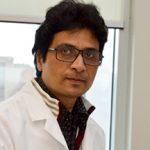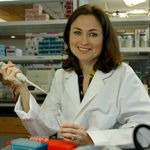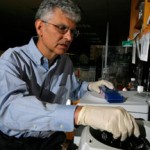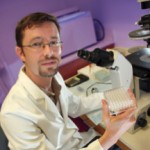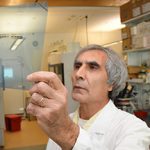Samuel Roberts Noble Cardiovascular Institute
Projects
OMRF’s Cardiovascular Biology researchers probe the mysteries of cardiovascular ailments and work to arm physicians with powerful new treatments for heart disease, colitis, lymphedema and sepsis.
Lijun Xia, M.D., Ph.D.
Xia’s work focuses on O-glycans, a form of sugar that the body produces and that comprises nearly 80 percent of a thick mucous layer inside the colon and the gastrointestinal tract. These sugars produced by the body play an important role in the development of colitis, Crohn’s disease and colon cancer.
Jasim Ahamed, Ph.D.
Ahamed joined OMRF in 2015 from The Rockefeller University, and his research centers on how blood clotting leads to the release and activation of a multifunctional protein that contributes to cancer, autoimmune disorders and cardiovascular disease.
Ahamed joined OMRF in 2015 from The Rockefeller University, and his research centers on how blood clotting leads to the release and activation of a multifunctional protein that contributes to cancer, autoimmune disorders and cardiovascular disease.
Courtney Griffin, Ph.D.
In the lab, Griffin use genetics, molecular biology, biochemistry and developmental biology techniques to study blood vessel and lymphatic system development in embryos and adults. She also focuses on programmed cell death and the processes that can lead to atherosclerosis and aneurisms.
In the lab, Griffin use genetics, molecular biology, biochemistry and developmental biology techniques to study blood vessel and lymphatic system development in embryos and adults. She also focuses on programmed cell death and the processes that can lead to atherosclerosis and aneurisms.
Rodger McEver, M.D.
McEver’s research focuses on how circulating blood cells attach to blood vessels at the sites of tissue injury or infection. Discoveries in his lab laid the groundwork for an experimental drug to treat sickle cell disease that’s currently undergoing clinical trials in patients.
McEver’s research focuses on how circulating blood cells attach to blood vessels at the sites of tissue injury or infection. Discoveries in his lab laid the groundwork for an experimental drug to treat sickle cell disease that’s currently undergoing clinical trials in patients.
Lorin Olson, Ph.D.
In his lab, Olson studies fibrosis, the creation of scar tissue in disease. Fibrosis can cause heart, kidney and liver failure, and it can also be an early event in the disease process leading to diabetes.
In his lab, Olson studies fibrosis, the creation of scar tissue in disease. Fibrosis can cause heart, kidney and liver failure, and it can also be an early event in the disease process leading to diabetes.
Ray Rezaie, Ph.D.
The program’s newest member studies blood clotting and inflammation, including how clotting factors work together to stop bleeding and how they regulate inflammatory responses when blood vessels are injured. This research is important to understanding the processes that can lead to heart attack, stroke or atherosclerosis.
The program’s newest member studies blood clotting and inflammation, including how clotting factors work together to stop bleeding and how they regulate inflammatory responses when blood vessels are injured. This research is important to understanding the processes that can lead to heart attack, stroke or atherosclerosis.
Sathish Srinivasan, Ph.D.
The lymphatic system is a network of vessels and lymph nodes that spans the entire body, absorbing tissue fluids and returning them to the blood stream. Srinivasan studies the defects that can lead to lymphedema, a dramatic and painful swelling in the limbs that can often lead to infections.
The lymphatic system is a network of vessels and lymph nodes that spans the entire body, absorbing tissue fluids and returning them to the blood stream. Srinivasan studies the defects that can lead to lymphedema, a dramatic and painful swelling in the limbs that can often lead to infections.


